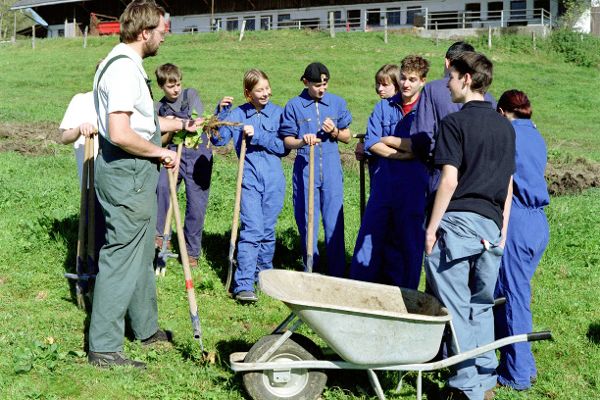Agricultural and Forestry Vocational and Educational Training (VET) Schools

In Austria, training at a VET school is offered at about 80 locations.
The agricultural and forestry vocational and educational training (VET) schools are secondary technical and vocational schools and fall within the competence of the Federal Provinces in cooperation with the Federal Ministry of Agriculture, Forestry, Regions and Water Management.
Statutory objectives of education and training
- Independent management of an agricultural and forestry holding or household
- Exercise of another responsible activity in agriculture and forestry
- Performance of the multifunctional tasks of agriculture and forestry
- Extension and deepening of the general education
Key competences
- Profound technical and general knowledge
- Handicraft skills
- Personal development and fulfilment
- Cooperation and communication skills
- Creativity and self-reliance
School-leaving qualifications, authorisations
- Substitute for the skilled workers examination in the main branch, if they can provide evidence of at least one year of agricultural practice
- Credits for or replacement of the commercial entrepreneurial exam, depending on the technical focus of the relevant VET school
- Admission to the master-of-profession examination in the relevant main branch of study
- Admission to the “Berufsreifeprüfung” (entitling to enrol in study programmes at universities)
- Eligibility for various agricultural subsidies and/or granting of higher aid intensities
- Reduction of the period of apprenticeship of another apprenticeship trade (agricultural and forestry or commercial) by at least one year. For certain combinations greater parts of the training may be credited, depending on the match.
- Access to advanced training courses of federal secondary colleges (“Höhere Bundeslehranstalten”)
Techical branches
- Agriculture
- Rural home economics
- Horticulture
- Pomology
- Viticulture and Cellarage
- Forestry
- Horse industry
School-autonomous priorities and cooperation with other schools
- School autonomy allows the setting of technical priorities in line with the specific educational needs of the relevant region. As the offer is continuously developed, we recommend you to contact the competent authorities.
- Agricultural commercial secondary school: Carinthia, Lower Austria
- Alternative animal husbandry: Tyrol
- Company and village aid school: Lower Austria
- Commercial secondary school for viticulture and agricultural management: Burgenland
- Agricultural and horticultural secondary commercial school: Styria
- Horse industry: Burgenland, Lower Austria, Upper Austria, Salzburg
- Social assistance and care sector (social und nursing professions): Carinthia, Lower Austria, Upper Austria, Styria, Tyrol
- Tourism (farm holidays, guest accommodation): Carinthia, Lower Austria, Upper Austria, Styria
- Environmental focus: Upper Austria
- Wine management: Lower Austria
- Commercial secondary school for wine marketing: Styria
- Training in two professions combining an agricultural profession with a non-agricultural one from the fields of wood processing, metal processing, the catering industry, the construction sector and EDP technology, surveying technology
Moreover, the VET schools also offer their graduates and people in rural areas further education and advice on current topics like EDP, management, processing of farm products and the like. They increasingly become education and training centres in rural areas.
Vocational and educational schools as second-chance education
They often make a completed vocational training a condition of admission. These schools offer an agricultural qualification after a non-agricultural vocational training.